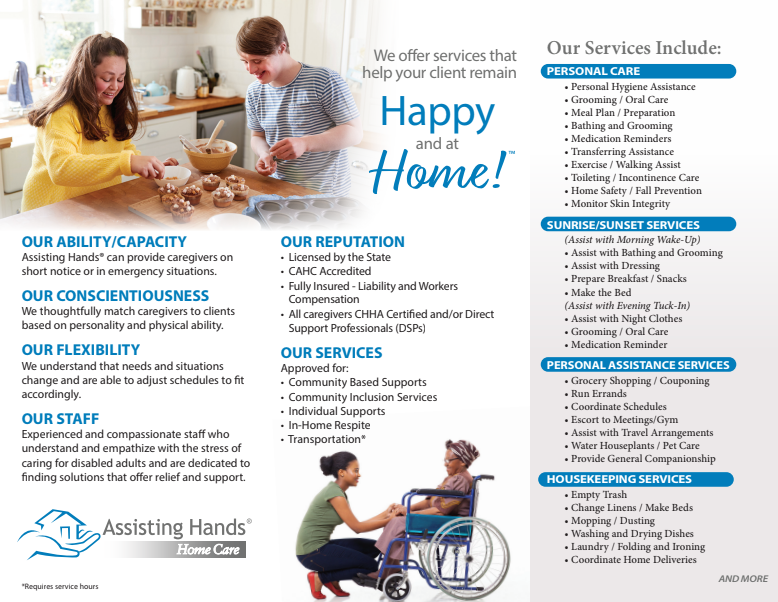Are you concerned about meeting the requirements for home care assistance in Illinois? This critical need impacts many, particularly when professional nursing or therapy services become necessary due to health issues. The forthcoming content will deconstruct the process to assess eligibility, outline the application steps, and review the range of services funded by Illinois assistance programs. By examining these key areas, readers will gain the confidence to navigate the complexities of securing aid for themselves or loved ones. This article acts as a guide, simplifying the journey toward the support of a registered nurse or caregiver in the comfort of one’s home.
Key Takeaways
- Medicaid and Medicare Advantage may cover home care agency costs for eligible Illinois residents
- Private insurance could provide funding for home health services, depending on the policy details
- Illinois home care agencies may offer sliding scale fees to make services more financially accessible
- Local non-profits and community services can offer additional support for home care costs
- Staying informed on program changes ensures compliance with current home care assistance policies
Discover Illinois Home Care Assistance Programs Available
In Illinois, individuals seeking home care assistance have a variety of programs to consider. Options range from insurance-funded services to non-Medicaid community support. This section will provide insights into diverse home health care agencies and aide opportunities, recognizing the complexities associated with disease management. The reader will learn about both public and private funding sources for home care while gaining knowledge on how to obtain health insurance coverage for these services. For detailed information, contacting Illinois agencies is advisable to understand program specifics and eligibility.
Understand Illinois Home Care Assistance Program Offerings
Illinois residents considering home care assistance programs can explore options through Medicaid and Medicare Advantage plans, both of which provide coverage for services that cater to the activities of daily living. This coverage often includes essential support such as physical therapy and assistance from a caregiver, enhancing the well-being of individuals with various health conditions. Acknowledging the critical nature of these programs, beneficiaries should consult with experts to ascertain their eligibility and comprehend the scope of services covered under each plan.
Concrete understanding of these offerings is the first step towards receiving the care necessary to live a dignified life. Programs under Medicaid are specifically tailored for low-income families, whereas Medicare Advantage Plans might offer additional perks, such as flexibility in choosing care providers. A structured approach to evaluating personal needs and existing coverage is essential:
- Assess the level of care required for activities of daily living.
- Confirm Medicaid eligibility or review Medicare Advantage plan benefits.
- Choose a qualified caregiver with experience in relevant services like physical therapy.
Ultimately, well-informed decisions can lead to improved care and peace of mind for both care recipients and their families.
Identify Various Home Care Options in Illinois
In Illinois, those with chronic conditions seeking supportive care have access to a variety of home care options. The presence of a licensed practical nurse, for instance, ensures that routine health monitoring and medication management are handled professionally in the comfort of one’s home. Gathering this information can help in making informed decisions regarding Medicare benefits and choices for personal care services, thus facilitating continuity of care and enabling comfort for patients.
Families can rely on comprehensive programs that integrate skilled nursing and therapy services, addressing the multifaceted needs of individuals requiring medical attention outside traditional healthcare facilities. These services, readily accessible through various Medicare-approved agencies, extend beyond basic aid, providing specialized care tailored to individual needs. As such, navigating the selection of a home care provider becomes critical in achieving optimal management of health conditions and ensuring the quality of life for those being cared for in their residences.
Explore Non-Medicaid Home Care Assistance Options
For Illinois residents who do not qualify for Medicaid, there are still numerous non-Medicaid home care options that promote accessibility and independence for individuals with disabilities or those in need of hospice care. These alternatives often stem from community-funded programs, private insurance, and out-of-pocket payments, enabling a broader range of individuals to receive customized home care in the United States. These services facilitate comfort and care at home, acknowledging the significance of familiar environments in enhancing patient well-being.
Additionally, exploring non-Medicaid avenues for home care assistance reveals a diverse landscape of resources catered to various needs, from disability support to end-of-life hospice care. Professional home care agencies offer a spectrum of services, allowing families to secure competent care without the constraints of public funding eligibility. This flexibility is vital as it encourages tailored care solutions that resonate with the personal circumstances and preferences of individuals seeking quality home life assistance.

Discover Funding Sources for Illinois Home Care
Securing funding for home care in Illinois involves navigating various sources that cater to medical and personal needs. With a particular emphasis on health care services for chronic conditions such as heart failure or routine blood pressure monitoring, understanding the financial avenues is crucial. Insight into these sources provides families with the strategies necessary to manage costs associated with long-term home care, ensuring access to essential medicine and treatment without undue financial stress.
Among these funding options, Illinois residents might explore public assistance through Medicare or Medicaid, which covers certain home health care services. However, it’s imperative to identify supplementary options: for individuals requiring specialized home care for conditions like heart failure, additional private funding may fill the gaps left by public assistance. By comprehensively assessing various funding avenues, patients and their families can craft a sustainable financial plan for home care services:
- Evaluating eligibility for Medicaid and Medicare programs for health care coverage
- Identifying private insurance plans that provide for home care needs
- Exploring community resources and charities that support home-based health services
- Considering out-of-pocket options for additional care requirements
Contact Illinois Agencies for Program Information
To effectively navigate the Illinois home care assistance landscape, initiating contact with relevant agencies is a practical step towards securing the right support. These organizations can provide comprehensive information on eligibility, background checks, and the integration of mental health and occupational therapy into home care plans, bolstering a patient’s quality of life. When approaching these resources, it is beneficial to have a prepared list of questions and any necessary documentation to streamline the process:
- Understanding eligibility criteria for various home care programs
- Interpreting the role of a thorough background check for care providers
- Gauging the extent of mental health services and occupational therapy availability
Connecting with agencies like the Department of Aging or local AARP offices can reveal essential guidelines and support networks that assist families and caregivers in creating an optimal home care environment. These agencies often have specialists who can clarify the nuances of enrolling in assistance programs, ensuring individuals receive necessary care that is conducive to maintaining independence and improving their overall quality of life.
Now that you understand the home care assistance programs Illinois offers, it’s time to take the next step. Determine your eligibility, and see how these services can support your journey towards well-being.
Find Out if You Qualify for Illinois Home Care Services
Securing home care assistance in Illinois requires meeting specific eligibility criteria. For those entwined in the healthcare industry, understanding these requirements is paramount, whether facing conditions such as stroke, managing diabetes, or needing support with exercise and meal planning. This section delves into assessing income and medical necessity, evaluating functional limitations, checking age and verifying residency requirements to determine eligibility for vital home care services.

Review Eligibility Criteria for Home Care Assistance
Eligibility for home care assistance in Illinois encompasses various factors, including the need for respite care, homemaking, or specialized support due to conditions like dementia. Individuals must have a clear medical need for these services, which can range from assistance with laundry to comprehensive in-home care for dementia patients. An assessment by a licensed healthcare provider typically determines the level of care required, enabling residents to access programs fitting their unique needs.
Understanding eligibility also involves a thorough review of one’s health status and financial circumstances. For Illinois residents, these criteria ensure that home care assistance is allocated appropriately, prioritizing those with the most pressing needs such as the elderly or disabled who require consistent support with daily activities. Knowledge of these requirements is critical for families and caregivers seeking quality in-home care for their loved ones, guiding them through the complexities of securing the necessary approval for assistance.
Assess Income Requirements for Illinois Home Care
To ascertain eligibility for home care assistance in Illinois, income serves as a crucial determinant. Individuals or families seeking skilled caregivers for conditions like chronic obstructive pulmonary disease must align with the income caps set forth by the insurance company or state programs. An in-depth understanding of these financial thresholds is imperative, especially when seeking specialized assistance from a therapist or seeking treatments related to pathology.
The process of evaluating income requirements for Illinois home care assistance often involves scrutinizing personal financial documents and the conditions under which care is received. For instance, if a potential recipient requires a highly skilled therapist to manage chronic obstructive pulmonary disease, the cost could be significant. Consequently, the insurance company may have precise guidelines on coverage eligibility based on income and medical necessity:
- Review of current income against state-set eligibility limits
- Examination of expenses related to chronic conditions and required pathology services
- Verification of insurance coverage for skilled therapist sessions
Determine Medical Necessity for Home Care Services
Determining the medical necessity for home care services in Illinois is a critical step in the eligibility process, directly affecting an individual’s ability to qualify for assistance. Those with severe mobility issues, or requiring specialized pain management, may find their needs meet the threshold for medical necessity. A healthcare provider’s assessment often focuses on the patient’s ability to perform daily tasks such as monitoring pulse, managing nutrition, or cooking without assistance.
When applying for home care, documentation of medical necessity should showcase a clear correlation between life insurance policy provisions and the health services required. For example, if an individual’s condition necessitates assistance with life-sustaining tasks, like pain management following a surgery, this information should be detailed in the application. Tailoring these details to the specifics of life insurance coverage can facilitate the approval process:
- Review life insurance conditions to determine coverage for prescribed home care services.
- Gather medical records detailing the necessity for pain management or assistance with tasks affecting nutrition and cooking.
- Seek a formal statement from a healthcare provider verifying the need for regular pulse monitoring as part of comprehensive care.
Understand Functional Limitations Criteria
Functional limitations serve as a key criterion in assessing eligibility for home care assistance in Illinois. For veterans or any individuals with significant disabilities, agencies examine the extent of the incapacity to perform daily activities independently. These agencies, tasked with determining program qualification, assess needs such as mobility assistance, personal care, or specialized health services that are critical to maintaining daily living standards.
When applying for home care programs, one’s inability to manage routine tasks such as bathing, dressing, and meal preparation due to functional limitations is evaluated by agencies providing these supports. Connecting with these agencies aids in determining if individuals qualify for programs designed to address physical limitations, thereby enabling continued independence in a home environment that fosters health and dignity.
Check Age Requirements for Home Care Eligibility
In Illinois, age requirements for home care assistance serve as a critical eligibility criterion, with certain programs specifically designed for the senior population. The state offers services including nurses for health monitoring, housekeeping, and even palliative care, aimed particularly at enhancing the quality of life for older adults. By initiating an online application, seniors and their advocates can start the process of verifying if they meet the age prerequisites, paving the way for support and care in the comfort of their own home.
Prospective applicants and their families are encouraged to consult with home care professionals to understand how age affects program eligibility. This proactive approach can offer clarity on services accessible to various age groups, whether it is skilled nursing for continuous health care or assistance with daily activities. As a result, the seniors’ advocates can ensure that the application process for essential home care is both informed and streamlined, directly addressing the individual needs of each potential recipient.
Verify Residency Requirements in Illinois
Residency is one of the key criteria for accessing home care assistance in Illinois, ensuring that those in need of elderly care or chronic condition management receive services within the state. To qualify, individuals seeking aid, for conditions such as diabetes management, need to showcase proof of residency which can include documentation like a state ID or utility bills. Working closely with a nurse practitioner or primary care provider can facilitate the verification process, providing the confirmatory evidence required by home care assistance programs.
Moreover, Illinois mandates that applicants reside in a home setting, as opposed to an institutional environment, to be eligible for many home-based care programs. This prerequisite is particularly important for those at risk of infection or requiring specialized home health services. By verifying residency and the type of living arrangement, the state ensures that resources are appropriately allocated, enhancing the availability and quality of home care for eligible residents in need of continuous support.
You’ve assessed your eligibility. It’s time to take the next step: applying for home care assistance in Illinois.
Learn How to Apply for Home Care Assistance in Illinois
Applying for home care assistance in Illinois begins with a thorough understanding of the application process and requirements. Individuals seeking such services must find and fill out the necessary forms, submit them to the designated agency, and schedule an assessment with a health care provider to determine eligibility. After submission, applicants await a decision while preparing for possible next steps post-approval, such as aging in place planning. This sequence ensures health equity and support through programs like WIC for those desiring to remain in their homes as they age. The ensuing sections unpack these stages in detail.
Start the Application Process for Home Care Assistance
Initiating the application process for home care assistance in Illinois starts with thorough research and collection of necessary documents. Individuals in need of emergency medical services, those undergoing cancer treatment, or patients requiring routine procedures such as catheter maintenance must provide proof of medical necessity. This typically involves coordination with healthcare professionals who can attest to the necessity of home care, ensuring that laboratory results and certification of conditions are accurately documented and submitted to the appropriate state agencies.
For many applicants, understanding the complexities of the system is vital, particularly in gathering accurate documentation and securing the right certifications. It’s crucial for those with conditions requiring specialized attention, like cancer patients, to have their laboratory work and emergency medical service records in order, simplifying the process of demonstrating the need for at-home care. An in-depth review of the application requirements, which often includes detailed medical histories and certification of qualifying conditions, is a key step toward achieving the objective of receiving adequate and timely home care assistance.

Find and Complete the Necessary Application Forms
Finding and completing the necessary application forms for home care assistance in Illinois is a significant step towards securing the required support for tasks like hygiene maintenance and memory management. These forms serve as a foundational element for individuals and families navigating the complexities of aging in place or transitioning from assisted living facilities. Emphasis is placed on providing clear, succinct information to ensure applicants can effectively showcase their requirement for home care, particularly in aspects of daily living that may induce stress without adequate assistance.
The process of application is streamlined when applicants have easy access to the pertinent forms and a comprehensive understanding of the information required. For instance, documents demonstrating the need for hygiene support, memory care, or household management should be at hand. Upon gathering the relevant data, individuals can approach the task with confidence, moving one step closer to establishing a supportive home environment:
- Collect statements from healthcare professionals supporting the need for assisted living services at home.
- Ensure financial records and assessment documents are prepared for submission.
- Verifying and including any legal documents relevant to home care needs.
Submit Your Application to the Appropriate Agency
Once the application is gathered, the final step is submission to the appropriate Illinois state agency responsible for overseeing home care assistance programs. This agency acts as the supervisor for approving services that manage diseases and provide support such as geriatric care and assistance with daily activities, like bathing. Timeliness and accuracy in submission are vital for the expeditious handling of applications and to avoid unnecessary delays in receiving assistance.
The submission process should be carefully handled to ensure that all requirements are met and documentation is complete. In the United States, and particularly in Illinois, the attention to detail in this process can greatly influence the speed at which services like disease management and geriatric care are initiated for eligible individuals. To ensure clarity in the steps to be followed:
- Verify that all forms are completed with accurate and up-to-date information.
- Include any supplemental documentation that provides evidence for the need for support with activities of daily living.
- Check that the application aligns with the specific guidelines of the Illinois state agency overseeing home care assistance.
Schedule an in-Person Assessment for Eligibility
Scheduling an in-person assessment is an essential step in determining eligibility for Illinois Home Care Assistance. This assessment allows healthcare professionals to evaluate the applicant’s needs and align them with the appropriate level of care. Family caregivers are advised to utilize the patient portal, if available, to secure an appointment as it streamlines the communication and helps manage cost and payment expectations, including potential Medigap coverage.
During the in-person assessment, the evaluators consider the medical and functional needs of the individual to ascertain the requisite home care services. The process often involves collaborating with family caregivers to understand fully the patient’s daily living requirements. This assessment plays a pivotal role in formulating a care strategy that accommodates financial considerations, such as cost-sharing and Medigap insurance, ensuring that the patient receives the essential care without imposing undue financial hardship.

Await Approval or Notice of Decision on Application
After the in-depth evaluation of the applicant’s needs and the meticulous data submission, awaiting approval becomes a period of anticipation. Illinois agencies process these applications with compassion, understanding the impact their decisions have on individuals requiring aid for cognition and daily life tasks. The review may include looking into any complaints filed, ensuring that applicants are paired with the most suitable care providers.
Once the agencies have completed their assessment, they notify applicants of the decision. It is during this phase that the value of accurate data and thorough documentation becomes clear, as they are pivotal in a favorable outcome. Should there be any issues or delays in approval, applicants are encouraged to exercise patience and empathy towards the evaluators, who are tasked with the complex responsibility of allocating home care assistance judiciously.
Understand Next Steps After Application Approval
Upon receiving approval for home care assistance in Illinois, the next steps involve coordinating with healthcare providers to implement the proposed care plan. This includes arranging the delivery of durable medical equipment, if necessary, and setting up home health nursing services. For those transitioning from nursing homes near me or care homes near me, it’s crucial to ensure that the support structure in their own residence seamlessly continues the level of care they require, particularly in terms of diet and medication management, to maintain their health and quality of life.
It is essential to maintain open communication with the agencies involved in home care assistance, as this facilitates any adjustments to care plans and addresses concerns swiftly. Individuals should also seek guidance about ongoing evaluations, which often play a role in ensuring that home health nursing services continue to match their evolving needs and circumstances. Regardless of whether the care is provided in their own homes or near care homes, the consistent aim is to deliver a standard of service that upholds dignity and promotes the well-being of each individual.
The path to securing home care assistance in Illinois begins with a first step. Gather your papers; the foundation of your application rests upon them.
Prepare Essential Documents for Your Application
Before applying for home care assistance in Illinois, preparing comprehensive documentation is paramount to demonstrate eligibility. Gathering proof of income and financial statements, along with accurate medical records and physician statements, lays the groundwork for a successful application. Proof of Illinois residency and personal identification documents are also essential, ensuring verification is streamlined. Additionally, compiling a list of current medications and treatments helps to articulate the need for in-home nursing care or support provided by the best nursing homes near me. Organizing all these elements is critical for smooth submission to home care agencies near me and could significantly affect approval outcomes.
Gather Proof of Income and Financial Statements
When preparing to apply for Illinois home care assistance, the financial eligibility of an applicant is a pivotal aspect. For those in search of services from a home health aide agency or in home health care near me, providing accurate financial statements is crucial. Substantiating income through documents such as pay stubs, tax returns, and Social Security benefits statements validates one’s financial standing, which is essential for home health care agencies near me to assess eligibility for aid programs designed for in home health care for seniors.
Reliable financial documentation not only demonstrates fiscal eligibility but also ensures a smooth engagement with the health care agency near me. Ensuring that these documents are in order before initiating the application process can prevent delays and guarantee that the supportive care needed is granted without hindrance. This organization is instrumental for applicants to articulate their need for various services that a home health care agency might offer, thereby streamlining the verification process for qualified in-home assistance.
Collect Medical Records and Physician Statements
When applying for home care assistance in Illinois, compiling a comprehensive dossier of medical records and physician statements is crucial for illustrating the applicant’s health condition and necessity for care. These documents are foundational to applications processed by health care agencies near me, as they validate the medical criteria stipulated by home health aide agency requirements. Accurate medical documentation facilitates a timely assessment by home health care services near me, expediting the eligibility determination process.
For an effective review by home health agencies, the applicant’s medical document compilation should include a detailed history of treatment, current health status, and professional evaluations from attending physicians. These records prove indispensable when home health care services coordinate care plans, ensuring they aptly reflect the individual’s unique health needs. To prepare for submission to home health agencies near me, the following items should be gathered:
- Detailed physicians’ statements explicating the need for home care services.
- Comprehensive medical history records that chronicle ongoing treatments and health assessments.
- Documentation of any chronic or acute conditions that necessitate assistance from home health care professionals.
Obtain Proof of Illinois Residency Documentation
Securing evidence of Illinois residency is a critical requirement when applying for home care assistance, as it ensures the services provided by visiting nurses and health care agencies are properly allocated. For those seeking support from a home health care agency or family home health care, presenting valid proof of residency, such as a driver’s license or a current utility bill, is indispensable. This documentation establishes a legitimate claim to the healthcare benefits available for care at home agency programs within the state.
Applicants must provide documentation that confirms their residency to satisfy home health care agency criteria. Documentation such as lease agreements, voter registration cards, or statements from Illinois-based employers can serve as proof to ascertain residency status. For a seamless verification process, consider the following:
- Gather recent utility bills with the applicant’s name and Illinois address.
- Include a copy of an Illinois driver’s license or state-issued ID card.
- Collect any government-issued documents, like tax returns, that confirm residence within the state.
Prepare Personal Identification Documents
As part of the application for home care assistance, personal identification is vital for obtaining services, such as those provided by home health aides near me or a home attendant. Applicants must furnish valid identification, which can include state-issued IDs, passports, or Social Security cards, to establish their identity clearly to both Medicare home health care and certified home health agency (CHHA) programs.
Ensuring that all personal identification documents are current and correctly reflect the applicant’s details is crucial for a seamless application process. Such meticulous preparation aids individuals looking for ‘home health care near me’ to expedite their access to home health care and the valuable support of home health aides near me that cater to their personalized care needs.
Compile List of Medications and Treatments
Compiling a comprehensive list of medications and treatments is crucial for individuals applying for Illinois home care assistance. This document should delineate all prescription drugs, over-the-counter medications, and ongoing treatments, thus aiding home health care providers in creating a tailored care plan that accounts for the unique medical needs of each client. A thorough medicines roster ensures that home health aides and personal care aides can administer and monitor medication effectively, reducing the risk of adverse drug interactions and health complications.
For the purpose of clarity and safety, the list should detail dosages, frequencies, and the prescribing physician’s details, offering a clear overview to both home health aide services and the home aide caring for the patient. Such precise documentation plays a pivotal role in communicating medical protocols to all parties involved in providing health care, affirming that the individual in need receives consistent and coordinated treatment aligned with their health care provider’s directives.
Organize All Required Documentation for Submission
Streamlining documentation for submission to Illinois home care assistance programs necessitates an organized approach that simplifies the assessment process for local home health care agencies. Applicants should consolidate all pertinent records, from financial statements to medical assessments, in a sequenced manner that aligns with the requirements set by home care near me resources. This preparation enables clear presentation of the applicant’s situation to in home health care evaluators, fostering a timely and affirmative response.
An organized compilation of essential documents is vital to expedite the approval process with home health care entities. This comprehensive package should present the applicant’s case cogently, reinforcing the need for assistance and demonstrating adherence to program stipulations. Careful assembly of these documents helps define the relationship between the prospective client and home care services, cementing the foundation for a smooth collaboration aimed at achieving optimal in home health care solutions.
With your paperwork in order, it’s time to look ahead. Next, we will navigate the breadth of services that Illinois Home Care Assistance offers to support your needs.
Explore Services Covered by Illinois Home Care Assistance
Eligibility for home care assistance in Illinois encompasses a wide range of services, aiming to support residents with daily activities and health care needs. Individuals can learn about personal care and grooming services to maintain their hygiene and appearance, find out about meal preparation and nutrition assistance to ensure dietary needs are met, and discover homemaking and household maintenance services that facilitate a safe living environment. Coverage also extends to medical equipment and supply needs, transportation assistance for appointments and errands, and respite care services that offer caregivers temporary relief. These vital aspects of home care will be reviewed, offering insight into how each contributes to comprehensive home-based support.
Learn About Personal Care and Grooming Services
Under Illinois home care assistance, personal care and grooming services are a foundational element for maintaining a client’s dignity and self-esteem. These services extend to aid with bathing, dressing, and other aspects of personal hygiene, managed by compassionate caregivers attuned to the unique needs of each individual. The provision of such intimate support underscores the significance of a respectful and skillful approach to home care, enhancing quality of life for the recipients.
Additionally, assistance with grooming activities such as hair care, oral hygiene, and nail care is designed to foster both comfort and self-confidence in clients, especially those with mobility concerns or cognitive impairments. Illinois home care programs prioritize these services as key components of a comprehensive care plan, recognizing their importance in bolstering the overall well-being and mental health of those in need. Caregivers are equipped to handle these tasks with sensitivity, ensuring the personal care needs of clients are met with excellence and consideration.
Find Out About Meal Preparation and Nutrition Help
Illinois home care assistance programs recognize the critical role of nutrition in maintaining health and independence for those requiring in-home support. A component of these services includes meal preparation and dietary guidance, ensuring that clients not only have access to nourishing meals but also maintain a balanced diet tailored to their health conditions. The dedicated caregivers involved in these programs are trained to handle specific dietary restrictions and work towards enhancing the client’s overall well-being through healthy eating habits.
For many receiving home care, the ability to manage meal preparation can become a challenging task. Illinois assistance programs address this need by providing support that spans from grocery shopping to cooking, taking into account the individual’s preferences and nutritional requirements. This service proves indispensable for seniors or individuals with disabilities who aim to sustain a certain level of autonomy, while ensuring their dietary needs are met with careful consideration and professional oversight.

Discover Homemaking and Household Maintenance Services
In the realm of Illinois home care assistance, homemaking and household maintenance services play a critical role for individuals unable to manage daily chores themselves. These services, which cover tasks like cleaning, laundry, and simple repairs, offer a safer and more comfortable living environment. By relieving the burden of household upkeep, care recipients can focus on their health and well-being, with homemaking support tailored to meet their specific home environment needs.
Qualified caregivers entrusted with homemaking duties understand the profound impact a well-kept home has on the quality of life of those they serve. They provide assistance that not only promotes cleanliness and organization but also adheres to the personal preferences and standards of the care recipient. This attention to a personalized living space is essential, as it contributes to the overall sense of autonomy and satisfaction felt by those receiving home care assistance in Illinois.
Understand Medical Equipment and Supply Coverage
Under Illinois home care assistance, the coverage for medical equipment and supplies is a vital factor for those managing chronic conditions or recovering from surgery. This provision ensures access to necessary medical items such as wheelchairs, hospital beds, and diabetes monitoring supplies, which are imperative for maintaining health and independence at home. Recognizing the specific equipment needs of each individual allows Illinois assistance programs to enhance the quality of in-home care.
Eligibility for medical equipment and supply coverage under these programs often depends on a healthcare provider’s prescription and a demonstrated need for the assistance these items provide. The supported equipment includes devices that assist with mobility, improve safety in the home, and facilitate the management of ongoing health conditions. Consistent access to these supplies ensures uninterrupted care and fosters a living environment conducive to recovery and well-being:
- Mobility aids such as walkers, canes, and wheelchairs
- Safety devices including shower seats and bathroom rails
- Health monitoring equipment like blood pressure cuffs and glucose meters
Explore Transportation Assistance Options
Illinois home care assistance programs recognize the importance of transportation support for individuals unable to drive due to health concerns or mobility restrictions. These services facilitate access to vital appointments, such as doctor visits and therapy sessions, ensuring that recipients continue to receive comprehensive health care without the barriers of transportation logistics impeding their progress.
Offering solutions for transportation also extends to helping individuals attend social engagements and errands, promoting a sense of independence and community connection. This aspect of home care assistance underscores the commitment to holistic support, considering not only the medical but also the social needs of individuals seeking in-home care, thereby enhancing their overall quality of life.
Review Respite Care Services for Caregivers
Illinois home care assistance recognizes the critical role caregivers play and the intense demands placed upon them, offering respite care services to alleviate their burden. These services provide temporary relief, allowing caregivers to rest and recuperate while ensuring their loved ones continue to receive professional and compassionate care in their absence.
The state’s provision of respite care highlights the importance of supporting those who dedicate themselves to the care of others, acknowledging that their health and well-being are essential to sustain the comprehensive care they give. By integrating respite care into home assistance programs, Illinois reinforces its commitment to fostering a sustainable caregiving environment that benefits both the caregiver and the recipient.
Knowing the services covered sets the course. What follows is securing your place at the helm.
Maximize Your Chances of Approval for Assistance
To secure approval for home care assistance in Illinois, it is pivotal that applicants take diligent steps throughout the application process. Ensuring the complete and accurate submission of all required forms sets the foundation for a streamlined review. Consistent follow-ups with one’s caseworker and timely responses to any issues or requests for additional information are key actions that can positively influence the outcome. Staying abreast of program changes and leveraging support from advocates or legal aid can also play a significant role in navigating the eligibility labyrinth successfully. The subsequent sections delve into these strategies in detail, offering insightful advice for applicants seeking to maximize their chances of securing the essential home care assistance they need.

Ensure Complete and Accurate Application Submission
To enhance the likelihood of approval for Illinois home care assistance, the precision of one’s application submission is paramount. Applicants must meticulously cross-reference their forms for completeness and factual correctness to prevent processing delays or outright denial. Accurate portrayal of personal information, medical documentation, and financial status is not just a bureaucratic requirement; it directly influences the efficiency with which care needs are assessed and met.
The applicant’s vigilance in ensuring the submission of a thorough and unblemished application cannot be overstated. Aggregating verifiable details, from the specifics of home care needs to the rigor of eligibility criteria, establishes a solid case for assistance. As such, scrupulous attention during the application process stands as a fundamental step toward securing the vital home care support that Illinois residents may require.
Follow Up Regularly With the Assigned Caseworker
Remaining in regular contact with the assigned caseworker can greatly increase an applicant’s likelihood of approval for Illinois home care assistance. This consistent communication demonstrates the applicant’s commitment to the process and allows for a more dynamic and responsive exchange of information, addressing any concerns or queries that may arise promptly.
A proactive approach in updating and discussing one’s application with the caseworker helps clarify potential ambiguities and propels the application towards successful outcomes. It also reinforces the urgency of the applicant’s need for home care assistance, keeping their case at the forefront as it moves through various evaluative stages.
Address Any Application Issues Promptly
Swiftly addressing any issues that arise during the application for Illinois home care assistance can significantly enhance the likelihood of approval. It is imperative for applicants to respond promptly to requests for additional information or to clarify discrepancies, demonstrating their attention to detail and their commitment to the process. This responsiveness serves not only to expedite the review but also to exhibit the applicant’s proactive approach and their earnest need for the assistance.
When an application encounters an obstacle, the resolution process should begin immediately to maintain momentum. Applicants are encouraged to engage with their caseworkers to resolve matters efficiently, providing revised documentation or supplementary evidence as required. This direct and attentive response underscores the importance of the application, ensuring that evaluators recognize the urgency and validity of the request for home care assistance.
Provide Additional Information When Requested
When the Illinois home care assistance program requests additional information, applicants must respond diligently and accurately. Such timely provision of requested details can enhance an applicant’s profile, demonstrating transparency and thoroughness in fulfilling program requirements. It’s an applicant’s responsibility to supply any supplementary evidence that might be crucial in substantiating their need for home care, ensuring that the review process progresses without unnecessary hurdles.
Ensuring that this information is furnished promptly to the respective agency serves to illustrate the readiness and earnestness of the applicant’s intent. It reflects a comprehensive understanding of the home care assistance program’s evaluation procedure and a commitment to comply fully with its guidelines. Quick and precise responses help maintain the application’s momentum, firmly supporting the applicant’s objective to secure essential care services.
Stay Informed About Program Updates and Changes
Staying up-to-date with Illinois home care assistance program changes is essential for applicants to align their submissions with current policies and requirements. Keeping abreast of legislative revisions or procedural updates allows an applicant to swiftly adjust their application or follow-up actions, thereby bolstering the approval process. Those seeking home care support are encouraged to regularly consult official state resources or speak with program officials to ensure they are informed of the most recent changes.
Regularly reviewing updates on the Illinois Department of Human Services website or subscribing to newsletters can provide applicants with critical information that may influence their eligibility for home care assistance. This proactive engagement showcases an applicant’s informed participation in the process and mitigates the risk of inadvertent non-compliance with new program stipulations. By prioritizing their awareness of the evolving landscape of home care assistance, applicants foster a more controlled and confident approach to navigating the complexities of the system.
Seek Assistance From Advocates or Legal Aid
Engaging the services of advocates or legal aid can significantly elevate an applicant’s prospects of obtaining Illinois home care assistance. These professionals provide invaluable guidance through the complex application process, ensuring that all legal requirements are thoroughly addressed and an applicant’s case is presented with compelling clarity. Their expertise can be the linchpin for those who find themselves navigating the intricate eligibility landscape, often making the difference between an approved or denied application.
Moreover, advocates and legal counsel can effectively identify and address potential roadblocks in the eligibility and application process, such as interpreting nuanced program rules or contesting a denial. Their involvement ensures that an applicant’s rights are protected and that their need for home care assistance is advocated for with informed precision. This level of support can be particularly beneficial for Illinois residents who may not have the resources or knowledge to advocate for themselves when seeking essential in-home care services.
Securing aid is the first step; managing the financial side comes next. Let us guide you through bridging the gap when engaging a home care agency.
How To Cover Costs When Hiring a Home Care Agency
When hiring a home care agency in Illinois, covering costs can be managed through various funding options such as Medicaid and Medicare Advantage, which often support services for eligible residents. It’s crucial to investigate these public programs, as they may provide significant financial relief for approved home care services.
Private insurance plans can also facilitate home care agency costs, particularly for those who have long-term care policies or benefits specifically intended for home health services. Reviewing one’s policy in detail is essential to understand the extent of the coverage and how it applies to hiring a home care agency.
For Illinois residents facing out-of-pocket expenses, many agencies offer sliding scale fees or payment plans, making services more accessible. Exploring these options with care providers allows families to budget effectively while ensuring their loved ones have the necessary support.
Community-based services and local non-profits in Illinois may have programs or grants designed to subsidize home care costs for individuals who do not qualify for Medicaid or have insufficient insurance coverage. Reaching out to these organizations can uncover additional resources to manage expenses associated with a home care agency.
Frequently Asked Questions
What are the different home care assistance programs available in Illinois?
Illinois offers various home care assistance programs including the Community Care Program, Illinois Department on Aging services, and Medicaid Waivers for seniors and persons with disabilities.
How can I determine if I’m eligible for home care services in Illinois?
To determine eligibility for home care services in Illinois, individuals should consult the Illinois Department of Aging, as eligibility often hinges on age, disability status, income level, and medical needs.
What steps should I take to apply for home care assistance in Illinois?
To apply for home care assistance in Illinois, contact the Department of Human Services, complete the required paperwork, and undergo a needs assessment to determine eligibility.
Which documents are necessary to include with my Illinois home care application?
For your Illinois home care application, include a completed application form, proof of insurance, background check results, and any relevant certifications.
Are there options to finance home care services if I don’t qualify for assistance?
Private pay, long-term care insurance, reverse mortgages, and personal loans are viable alternatives to finance home care for those ineligible for assistance.
Conclusion
Navigating eligibility for Illinois home care assistance is crucial for those seeking to maintain quality of life while managing health conditions at home. A thorough understanding of the various programs offered, along with their specific requirements, enables individuals to secure the necessary support and services. Staying vigilant in the application process and promptly addressing any requests for additional information are key to maximizing the chances of approval. Ultimately, effective navigation of this complex system leads to enhanced care, improved well-being, and the dignified independence of Illinois residents in need.



















